
By Amber Veverka
Coming up with an amazing idea, and turning it into a money-making reality. Walking away from the cubicle life forever. Running something yourself.
They’re heady dreams for would-be entrepreneurs, who found both caution and encouragement at the Wake Forest University School of Business Deacon Discussion Panel June 14 in uptown Charlotte. There, a crowd of more than 90 alumni and guests listened to panelists describe their journeys to entrepreneurship – and offer advice for others who itch to build their own startups.
The event brought together six panelists who have created everything from tech startups to consulting businesses to personal care companies. Each had a different path to business creation, but all share a common drive to make dreams real. That drive is essential, they said, because the road becoming your own boss has more potholes and blind curves than you’ll ever expect.
“This is what I wanted to do. I knew any short-term inconvenience was worth it,” said panelist Logan Miller (MBA, ’16), founder of Imperative Strategies & Solutions, a team of creative business consultants. “Until you burn the bridge behind you and you know there’s no retreat, you won’t commit to get through the scary stuff.”
Fighting fear
About that scary stuff. “Worry” may not be a key step on any business plan, but each panelist had stories to share.
For Meg Seitz, (MBA ’13), the owner of toth shop, a Charlotte-based writing and branding agency, “scary” came in the form of launching her firm when she had just exactly enough clients to cover the bills. For Nicole Vieira (BS ’06, MSA ’12), co-founder with her sister of The Daily Details, an upscale beauty bar, it was during the negotiations for space with leaseholder Wells Fargo. With serious money at stake, Vieira’s dream “got really real.”
Aru Anaveker, (MBA ’14), says the anxiety can grow with your business. In her case, it’s the challenge of keeping up with demand with botsplash, her customer-engagement software company. “Scalability: it’s a good problem to have. I would love to more clients,” she said, “but we are extremely thinly staffed.”
And all of the panelists reminded their audience that even after the dizzying days of launch time, running your own company means the buck – and the worry – stop with you.
“The stress can be pretty bad,” said Ramy Serageldin, who earned his Wake Forest BA in economics and computer science. He held up his wrist. “I didn’t get this for tracking steps. I got this Fitbit purely to track my sleep. You can be so dedicated to what you’re doing that you forget to take care of yourself.”
The first ingredient: An amazing idea
Of course, it all starts with noticing a need – and then, the spark of an idea. For Seitz, the idea was filling a gap she saw among numbers- minded colleagues who didn’t know how to tell their story. She began freelancing, writing pitch decks for people going after business funding, creating marketing copy.
Vieira was a CPA when she started to notice that while her male coworkers could pop out of the office at lunchtime to get a haircut, there was a dearth of similar resources for professional women in the heart of Charlotte’s uptown. “There are 100,000 people who cross Trade and Tryon every week, and half of those are women,” she said.
Serageldin’s personal experience led to his startup.
“My wife and I were not the greatest at communicating about money,” he told the audience. “Some 65 percent of couples don’t merge their finances and that causes planning challenges.” Serageldin took both nuggets of information – and his banking experience – to launch Honeyfi, a free app that helps couples simplify finances and spend mindfully.
Alex Smereczniak was a Wake Forest undergraduate when he got involved in a student-owned business laundry business for fellow students. Laundry service was free for students, but still, plenty of them (and their parents) would pay for a laundry pickup. Smereczniak, (BS ’14), took that knowledge with him into the post-college work world, and in January 2016 quit his full-time job to launch 2U Laundry in Charlotte. His research showed him that people pay for quality and convenience when it comes to their clothes-cleaning, and he vertically integrated his company to control both.
Getting to ‘yes’
Audience members were curious about the money behind the dreams. Most of the panelists used savings and investments from friends, family and early employees to get their companies off the ground, cutting their own living expenses to the bone. Later, several raised capital, wading through all of the “No’s” to get to the single “Yes.” Smereczniak, who when he started his business, was actually washing customers’ clothes in his apartment, last year raised $2.5 million last year to build a Charlotte laundry facility. The investment will allow the business to grow, prove itself, and expand.
The process of keeping a business healthy can be grueling, the panelists agreed, but for those who dream of running something themselves, it’s entirely worth it.
“I can’t go back to corporate, ever,” said Smereczniak.
 The night’s discussion resonated with Lashauna Harris, an evening MBA student at the School of Business. She and a friend, TaKayla Sexton, both work full-time but have dreams of creating an ecommerce business together. They said the panelists spoke their language.
The night’s discussion resonated with Lashauna Harris, an evening MBA student at the School of Business. She and a friend, TaKayla Sexton, both work full-time but have dreams of creating an ecommerce business together. They said the panelists spoke their language.“We have that hustle mentality,” Harris said. Her takeaway from the discussion was to “start with what you have, and connect to the customer and customer needs.”
Some who attended are so poised to take the plunge into entrepreneurship they didn’t want their names shared, because they’re so close to quitting their day jobs. That was the case with a recent MBA alum who came out to pick up tips, because the business idea he’s working on – a Hawaiian poke restaurant – is just weeks from launch, though he hasn’t yet turned in his resignation notice yet from his 9-to-5. The panel was inspiring, he said.
“I feel more excited, because they’re doing it and it’s more validation,” the alum said as he left the event. “You see this person was willing to take a chance, and they’re successful – so why not me?”
Amber Veverka is a freelance writer based in Charlotte, N.C.

 336-758-5422
336-758-5422